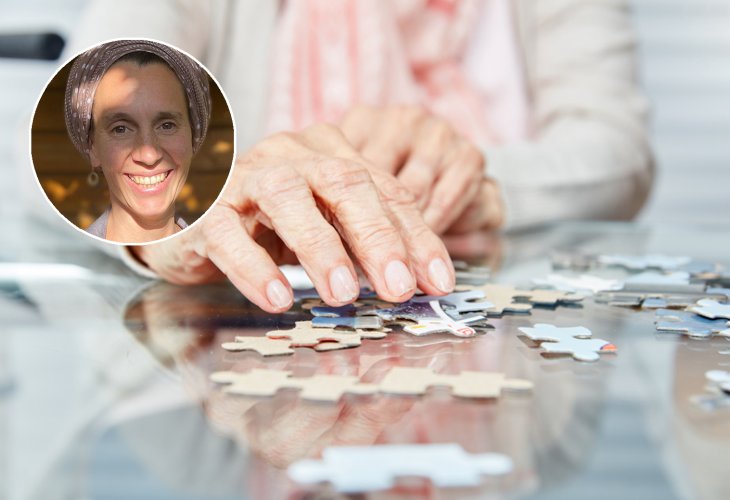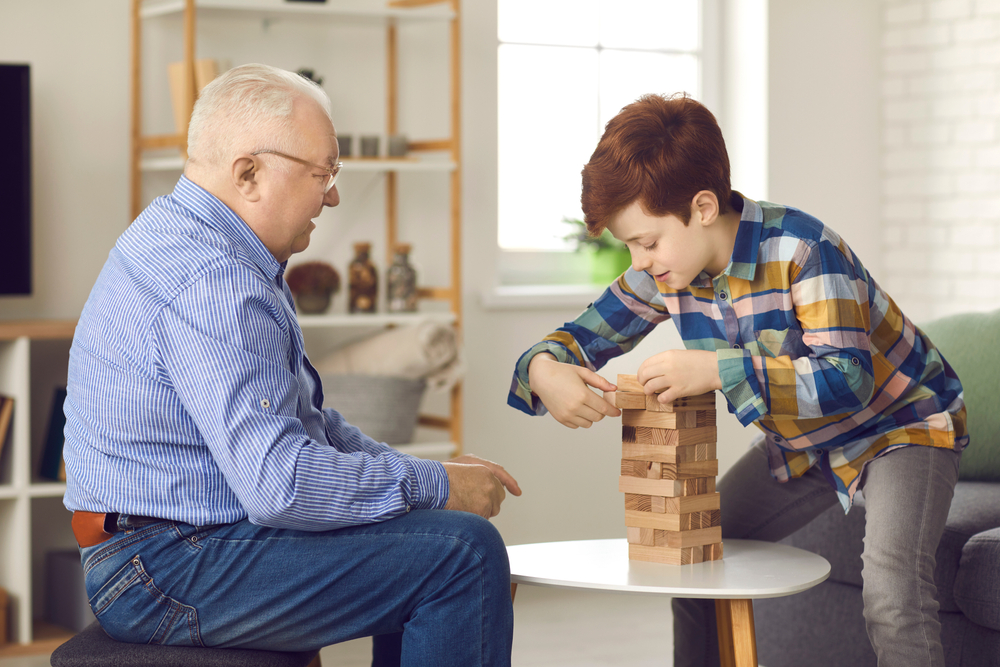"I Have 250 Wonderful Ideas for Seniors with Dementia"
It's not easy to see our aging parents start to get confused and forgetful. Tamar Deshevsky, a gerontology researcher, is convinced that even in severe dementia cases, there are ways to enjoy time with parents, bring them joy, and even engage with them. What are these creative ideas and how can one experience this period in the least painful and most effective way?
 In circle: Tamar Deshevsky (Photo: shutterstock)
In circle: Tamar Deshevsky (Photo: shutterstock)One of the hardest things for anyone, regardless of their exact age, is seeing their parents in a state where they begin to forget and get confused. Suddenly, the energetic mother who took care of them for years, gave good advice, and ran the world, forgets where she placed items, or the organized father struggles to remember what he planned to do in a moment and what's next for the day.
Dementia, or if you prefer - Alzheimer's (the most common type of dementia) affects a very high percentage of the population, and worst of all, it only deteriorates day by day. This might be why it's so surprising to hear Tamar Deshevsky, a social worker with a master's in gerontology, clearly state that even this difficult period can become an opportunity of a lifetime. According to her, directly from the difficult challenges faced by parents, the relationship can be strengthened, and you can work with them in a variety of ways.
 (Photo: shutterstock)
(Photo: shutterstock)The Person Behind the Disease
Tamar has been involved in gerontology since her twenties and accompanies families through 'Family Anchor.' During her fieldwork, she has encountered thousands of families eager to connect with elderly grandparents but hit a barrier when not getting desired responses.
"It often seems that grandparents are not at all pleased with the visit; sometimes they cannot even communicate with the grandchildren, leading to a difficult feeling, like – 'why did I come if Grandpa can't respond, or doesn't even want the grandchildren close?'"
Tamar investigated the topic, interviewing many grandchildren, as well as children of aging parents, and of course, the elderly themselves. "It was chilling to see how important it is for everyone to feel they can still maintain a connection, even in tough situations," she says.
But what can be done when it feels like Grandpa is really not with us?
"My belief is that every person should feel loved and needed," claims Tamar, "Dementia is a very challenging illness. It drastically changes the brain's structure, making it difficult for a person to retrieve words and memories, and manage daily life. But there are still things they can do. Our job is to allow them to do those things as much as possible.
"Some feel like once their father is diagnosed with dementia, his entire essence becomes the illness, but that's not true. He continues to be a person and deserves to realize his potential. Even if suffering from Alzheimer's, he can still play with the grandkids, maybe look through photo albums as he always loved. One of the granddaughters I interviewed for my research, a sweet 10-year-old, honestly said: 'It drives my mom crazy when Grandpa repeats everything so many times, but it doesn't bother me... I love playing rummy and ball with him, even though I always win, it doesn't bother me, and I see Grandpa smiling when he's with me.'
But when we leave the house, it seems like Grandpa doesn't even remember we were there!
"So what?" Tamar marvels, "I am a mother of five children, and I'm aware that not everything I do with them now will be remembered in the future. Despite this, I take them to the playground, do homework with them, and hug them. I do it because it's our foundation, not because of future memories. The same goes for our parents - we should not always think about long-term benefits, but rather simply be with them, hug them, and bring joy, even if in two minutes they will forget we were there. There's no doubt that even in difficult moments, where they might not express their feelings, they feel loved and happy because of the attention we give them, they feel part of a family system, and that means a lot.
"Moreover, I must emphasize that it's not just for them, but for us. Our parents, or grandparents, won't live the years we will have, at some point they will move to the next world. I've met many family members left frustrated and disappointed after their parents left this world. They felt as if they didn't do enough and didn’t maximize the time they had together. The more we act and genuinely try to give them what we can, the less that disappointment will haunt us."
 (Photo: shutterstock)
(Photo: shutterstock)
There is a Chance, There is Hope
Tamar provides examples of simple activities we can do with grandparents: "If you visit them and they are on their way to sleep, even if they are in an institution and not at home, sit beside them as they lie down and hold their hand until they fall asleep. These moments before sleep can be their loneliest; if you gently stroke them or sing a soft song – it will show them someone is there with them.
"I highly recommend finding out what recipes Grandma and Grandpa often prepared and try to recreate them, as much as possible. The tastes and smells provide a familiar sensation. Generally, it's advisable to give grandparents chances to smell different scents; it stimulates dormant brain cells.
"When you leave – make them feel appreciated by leaving a small note with a message like: 'Dear Grandma, I had a really great time with you today, I'll come again tomorrow, your granddaughter Rachel.' Place the note on their pillow or bathroom mirror, in a visible spot, so even if they forget you visited, the note will remind them and warm their heart.
"I also strongly recommend using music, preferably songs from the years when Grandma and Grandpa were young, ideally those popular in their countries of origin. And most importantly - give a hug, hold their hand, just be there. Often it's far stronger and more needed than any game, activity, or conversation."
Are there later stages in the illness where the ideas you've mentioned might not fit anymore?
"I believe 95% of the ideas I suggest in my book suit almost everyone, each according to their state. Even when a senior is in a very severe condition, they can usually hold our hand and softly stroke a doll or a pet with us, and many other things. Of course, the earlier one engages in the process, the more help can be provided."
Conversely, are there things that you would absolutely not recommend?
"First and foremost, I advise against making drastic and sudden changes. For instance, when deciding to move a parent out of their home, and transfer them all of a sudden to a nursing home or a child's home. Even if the move is necessary and correct, it must be done gradually. The parent should be allowed to say goodbye to their home, library, and local grocery store... The transition must not be too abrupt. It's dangerous.
Tamar also points out that often with dementia sufferers, you find that too many stimuli cause confusion and can be very annoying. "Don't overwhelm dad all at once with music, new faces, food, and various talks. Additionally, sometimes small things can be very bothersome, like a clothing tag or annoying heat, try noticing these as Grandpa might not express it himself. Something crucial to avoid is asking Grandma and Grandpa embarrassing questions, such as 'What's my name?' or 'Tell me about your childhood years' while knowing they'll struggle to answer. It's awkward and uncomfortable.
"Naturally, specific points also vary from one senior to another – some might not be suitable for large family meals, causing unnecessary confusion and panic, often continuing to feel alone despite sitting among a crowd. In contrast, others best thrive when attending meals. Even if they don't engage in conversation with family, simply seeing people around them and smelling the aromas – ignites a sense of vitality in them. There are no clear rules, simply because dementia isn't like the flu. The flu manifests almost the same in everyone, with nearly identical symptoms, but dementia varies greatly from one person to another – some who were always calm suddenly become aggressive, some fall into depression, and others become happier, some start to hug and show affection, while others become cold. Thus, beyond any book or advice you read or receive, try asking yourself what your parent truly needs.
"At the same time, I would gladly convey the message to families that we don't have to know everything. It’s much like before a first birth, arriving with minimal knowledge and no experience, but you can always read, listen, and also consult with people who have experienced the same situation."
Emerging Stronger and Strengthened
From your experience, is there a way to prevent the disease from the outset?
"Unfortunately, there’s still no such possibility, but it's important to know the disease isn't genetic, and over the years, factors that assist in delaying its development have been discovered. For instance, belonging to a community, learning languages, and playing instruments, avoiding smoking, maintaining a healthy diet, and exercising the brain. This is why I recommend that the children of aging parents – seek advice from them, involve them in your lives, and ask them to help solve dilemmas. Help them recharge their remaining brain cells not just with Sudoku; it's so important.
It's commonly argued that many rabbis reach old age with clarity thanks to Torah study. Is there indeed a scientific connection?
"Yes, among rabbis and scholars, there’s an amazing combination where they engage for years over years in learning, debating, and exercising the brain – which certainly contributes to clarity. Moreover, people frequently seek their advice as part of their role, which also stimulates the brain. They also go out three times a day for prayers, meet people, and feel a strong sense of community belonging – all of these prevent brain degeneration. There's no doubt it's a winning combination."
 (Photo: shutterstock)
(Photo: shutterstock)In conclusion, Tamar notes that she recommends entering this journey with faith that we've been given a role here, though not chosen by us, it’s a role given by Hashem.
"And we can also see the gifts available during this challenging time. For instance, someone told me: 'Mom spent her life only giving and giving, never agreeing to receive anything in return, and now I can finally reciprocate for that,' or another person said: 'In the past, I was so distant from mom, and now suddenly I can hug her.' Overall, there's no doubt it's a great opportunity to express gratitude. Many families also discover how much the bond between siblings tightens thanks to the parents' dementia. So let's not focus on the difficulty, although it surely exists, but see how we can leverage it and emerge strengthened."
Contact Tamar: tamaruzi@gmail.com

